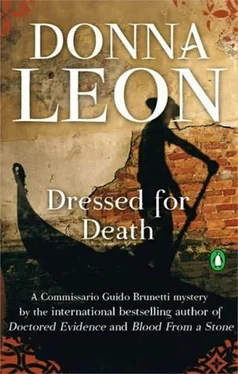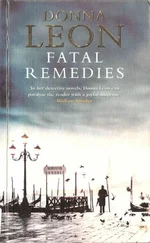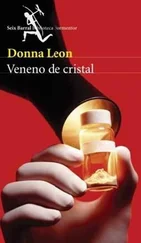Donna Leon - Anonymous Venetian aka Dressed for Death
Здесь есть возможность читать онлайн «Donna Leon - Anonymous Venetian aka Dressed for Death» весь текст электронной книги совершенно бесплатно (целиком полную версию без сокращений). В некоторых случаях можно слушать аудио, скачать через торрент в формате fb2 и присутствует краткое содержание. Жанр: Детектив, на английском языке. Описание произведения, (предисловие) а так же отзывы посетителей доступны на портале библиотеки ЛибКат.
- Название:Anonymous Venetian aka Dressed for Death
- Автор:
- Жанр:
- Год:неизвестен
- ISBN:нет данных
- Рейтинг книги:3 / 5. Голосов: 1
-
Избранное:Добавить в избранное
- Отзывы:
-
Ваша оценка:
- 60
- 1
- 2
- 3
- 4
- 5
Anonymous Venetian aka Dressed for Death: краткое содержание, описание и аннотация
Предлагаем к чтению аннотацию, описание, краткое содержание или предисловие (зависит от того, что написал сам автор книги «Anonymous Venetian aka Dressed for Death»). Если вы не нашли необходимую информацию о книге — напишите в комментариях, мы постараемся отыскать её.
Anonymous Venetian aka Dressed for Death — читать онлайн бесплатно полную книгу (весь текст) целиком
Ниже представлен текст книги, разбитый по страницам. Система сохранения места последней прочитанной страницы, позволяет с удобством читать онлайн бесплатно книгу «Anonymous Venetian aka Dressed for Death», без необходимости каждый раз заново искать на чём Вы остановились. Поставьте закладку, и сможете в любой момент перейти на страницу, на которой закончили чтение.
Интервал:
Закладка:
When he got to the Questura the following morning, he was surprised to discover that Patta had found time, before he left for Milano the previous day, to request of the instructing judge a court order that would provide them with the records of both the Lega della Moralità and the Banca di Verona. Not only that, but the order had been delivered to both institutions that morning, where the officials in charge had promised to comply. Though both institutions insisted it would take some time to prepare the necessary documents, neither had been precise on just how long that would be.
By eleven, there was still no sign of Patta. Most of the people who worked in the Questura bought a newspaper that morning, but in none of them was there mention of Burrasca’s arrest. This fact came as no surprise, neither to Brunetti nor the rest of the staff, but it did a great deal to increase the eagerness, to make no mention of the speculation, about the results of the Vice-Questore’s trip to Milano the evening before. Rising above all of this, Brunetti contented himself with calling the Guardia di Finanza to ask if his request for the loan of personnel to check the financial records of both the bank and the Lega had been granted. Much to his surprise, he learned that the instructing judge, Luca Benedetti, had already called and suggested that the papers be examined by the Financial Police as soon as they were produced.
When Vianello came into his office shortly before lunch, Brunetti was sure he had come to report that the papers had not arrived or, more likely, that some bureaucratic obstacle had suddenly been discovered by both the bank and the Lega, and delivery of the papers would be delayed, perhaps indefinitely.
‘Buon giorno, Commissario,’ Vianello said when he came in.
Brunetti looked up from the papers on his desk and asked, ‘What is it, Sergeant?’
‘I’ve got some people here who want to talk to you.’
‘Who?’ Brunetti asked, placing his pen down on the papers in front of him.
‘Professore Luigi Ratti and his wife,’ Vianello answered, offering no explanation save the terse, ‘from Milano.’
‘And who are the professor and his wife, if I might ask?’
‘They’re the tenants in one of the apartments in the care of the Lega, have been for a little more than two years.’
‘Go on, Vianello,’ Brunetti said, interested.
‘The professor’s apartment was on the part of the list I had, so I went to speak to him this morning. When I asked him how he had come by the apartment, he said that the decisions of the Lega were private. I asked him how he paid his rent, and he explained that he paid two hundred and twenty thousand lire into the Lega’s account at the Banca di Verona every month. I asked him if I might take a look at his receipts, but he said he never kept them.’
‘Really?’ Brunetti asked, even more interested now. Because there was never any telling when some agency of the government would decide that a bill had not been paid, a tax not collected, a document not issued, no one in Italy threw out any official form, least of all proof that some sort of payment had been made. Brunetti and Paola, in fact, had two complete drawers filled with utility bills that went back a decade and at least three boxes filled with various documents stuffed away in the attic. For a person to say he had thrown away a rent receipt was either an act of sovereign madness, or a lie. ‘Where is the professor’s apartment?’
‘On the Zattere, with a view across to the Giudecca,’ Vianello said, naming one of the most desirable areas in the city. Then he added, ‘I’d say it’s six rooms, the apartment, though I saw only the entrance hall.’
‘Two hundred and twenty thousand lire?’ Brunetti asked, thinking that this was what Raffi had paid for a pair of Timberlands a month ago.
‘Yes, sir,’ Vianello said.
‘Why don’t you ask the professor and his wife to come in, then, Sergeant? By the way, what is the professor a professor of?’
‘I don’t think of anything, sir.’
‘I see,’ Brunetti said and screwed the cap back on to his pen.
Vianello went over to the door and opened it, then stepped back to allow Professore and Signora Ratti to come into the office.
Professore Ratti might have been in his early fifties, but he was keeping that fact at bay to the best of his ability. He was aided in the attempt by the ministrations of a barber who cut his hair so close to the scalp that the grey would be mistaken for blond. A Gianni Versace suit in dove-grey silk added to the youthful look, as did the burgundy silk shirt which he wore open at the throat. His shoes, which he wore without socks, were the same colour as the shirt, made of woven leather that could have come only from Bottega Veneta. Someone once must have warned him about the tendency of the skin under his chin to wattle, for he wore a knotted white silk cravat and held his chin artificially high, as if compensating for a careless optician who had put the lenses in his bifocals in the wrong places.
If the professor was fighting a holding action against his age, his wife was engaged in open combat. Her hair bore an uncanny resemblance to the colour of her husband’s shirt, and her face had the tautness that came only from the vibrancy of youth or the skill of surgeons. Blade-thin, she wore a white linen suit with a jacket left open to display an emerald-green silk shirt. Seeing them, Brunetti wondered how they managed to walk around in this heat and still look fresh and cool. The coolest part of them was their eyes.
‘You wanted to speak to me, Professore?’ Brunetti asked, rising from his chair but making no attempt to shake hands.
‘Yes, I did,’ Ratti said, motioning to his wife to sit in the chair in front of Brunetti’s desk and then going, unasked, to pull a second from where it stood against the wall. When they were both comfortable, he continued, ‘I’ve come to tell you how much I dislike having the police invade the privacy of my home. Even more, I want to complain about the insinuations that have been made.’ Ratti, like so many Milanesi, elided all of the R’s in his speech, a sound which Brunetti could not help associating with actresses of the more pneumatic variety.
‘And what insinuations are those, Professore?’ Brunetti asked, resuming his seat and signalling to Vianello to stay where he was, just inside the door.
‘That there is some irregularity pertaining to my tenancy.’
Brunetti glanced across at Vianello and saw the sergeant raise his eyes towards the ceiling. Not only the Milano accent but now big words to go with it.
‘What makes you believe this insinuation has been made, Professore?’ Brunetti asked.
‘Well, why else would your police push their way into my apartment and demand that I produce rent receipts?’ As the professor spoke, his wife was busy running her eyes around the office.
‘ “Push”, Professore?’ Brunetti asked in a conversational voice. ‘ “Demand”?’ Then, to Vianello, ‘Sergeant, how did you gain access to the property to which the professor has…’ he paused, ‘tenancy?’
‘The maid let me in, sir.’
‘And what did you tell the maid who let you in, Sergeant?’
‘That I wanted to speak to Professore Ratti.’
‘I see,’ Brunetti said and turned his attention back to Ratti. ‘And how was the “demand” made, Professore?’
‘Your sergeant asked to see my rent receipts, as if I’d keep such things around.’
‘You are not in the habit of keeping receipts, Professore?’
Ratti waved a hand, and his wife gave Brunetti a look of studied surprise, as if to suggest what an enormous waste of time it would be to keep a record of a sum so small.
Читать дальшеИнтервал:
Закладка:
Похожие книги на «Anonymous Venetian aka Dressed for Death»
Представляем Вашему вниманию похожие книги на «Anonymous Venetian aka Dressed for Death» списком для выбора. Мы отобрали схожую по названию и смыслу литературу в надежде предоставить читателям больше вариантов отыскать новые, интересные, ещё непрочитанные произведения.
Обсуждение, отзывы о книге «Anonymous Venetian aka Dressed for Death» и просто собственные мнения читателей. Оставьте ваши комментарии, напишите, что Вы думаете о произведении, его смысле или главных героях. Укажите что конкретно понравилось, а что нет, и почему Вы так считаете.












